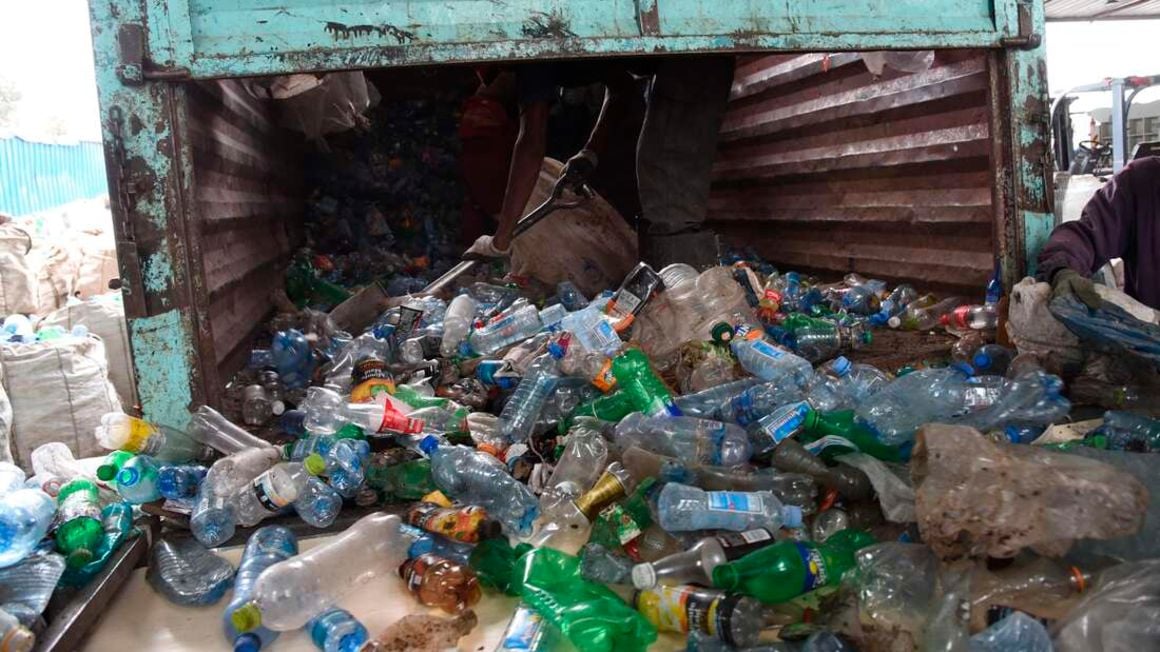
Plastic bottles for recycling at a plant in Athi River. PHOTO | EVANS HABIL | NMG
Rapid urbanisation and development have led to an increase in the consumption of products and waste generation in the
country and across the globe.The United Nations Environment Programme (Unep) projects that by 2025, the world's cities will produce 2.2 billion tonnes of waste every year, more than three times the amount produced in 2009. This calls for immediate actions to sustainably manage waste.
The Unep proposes three key steps to address the waste challenge: establishing control over waste; implementing environmentally sound management of waste; and moving towards circularity by considering waste as a secondary resource.
Cognizant of this, the manufacturing sector is committed to transitioning to green manufacturing for sustainable development.
We are witnessing more manufacturers embed circular economy and sustainability in their operations, for instance, sustainable waste management practices.
Adopting a circular economy is about resources moving from cradle to cradle, where waste from one process is a resource in other processes, instead of cradle to grave, where the impact created by the disposal of products has a negative effect on the environment. The circular economy is based on three principles: eliminating waste and pollution; circulating products and materials; and regenerating nature.
Denmark, for instance, incinerates its waste to generate district heating and electricity. They continue to perfect this technology year after year, towards the production of clean electricity for their citizens.
Whilst doing so, Denmark continues to ensure that the operation of these plants has the lowest environmental impact possible.
Therefore, accelerating the transition to a circular economy is one of the surest ways of securing the future of our planet for generations to come.
It cuts across every stage of the value chain and touches on energy use, sourcing of raw materials, production, distribution, and waste management.
We need to strengthen our will towards a circular economy through various efforts, as a nation, including inculcating it in our education system from the primary level. As individuals, we need to cultivate a strong ethos of respecting and protecting our environment and natural resources, for better living.
Most importantly, we must collaborate with other players such as government regulators, waste collectors, recyclers, and the public for a successful transition.
Kenya Association of Manufacturers (KAM) continues to partner with like-minded organizations to shape the conversation on circular economy and to bring out the various solutions available towards the realisation of circular approaches where reduction, reuse, recycle and elimination of waste are at the centre stage.
One such initiative is the LOOP Forum, which seeks to showcase circular innovative solutions, catalyse policy dialogues, and establish business-to-business collaborations to transition Kenyan economy from a linear to circular model. The Forum aims to accelerate a circular transition together with all the stakeholders and partners being part of the process.
During the inaugural LOOP Forum held last year, three key aspects were discussed. First, the need to have proper, clear, realistic, and full operational regulations in waste management and more so towards circular economy to allow for a faster transition from linear economy towards circular economy.
Second, the need for entities to form partnerships, be it international, local or between the government and the private sector as this is a sure way to transition towards a circular economy. Lastly, the need for all stakeholders to work together for the transition to the circular economy to be realized and for cleaner production to take place.
This year’s forum, taking place this week seeks to establish a platform to facilitate the exchange of knowledge, solutions, and build networks amongst relevant stakeholders; showcase cross-sector innovations, business-to-business collaborations and investment opportunities; build awareness on cleaner production methods and wider societal, environmental, and economic benefits of a circular economy; and explore intervention for skills development and job creation to support Kenya’s transition to circular economy.
The writer is the Chair of the KAM Environment and Sustainability Committee. He can be reached at info@kam.co.ke.




No comments :
Post a Comment